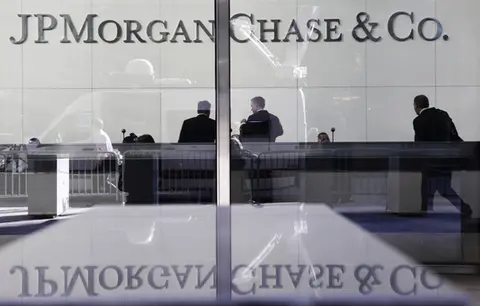China's financial regulatory body has issued its first business license to a foreign asset management company, according to a press release from the company on Sept. 6.
The 20-year J.P. Morgan license is registered in Shanghai’s free-trade zone. It permits a broad scope of asset and investment management, plus consulting, on the condition of other regulators’ permission.
J.P. Morgan Asset Management (JPMAM) announced in a press release that it has received a business license from the Market Supervision Administration of China (Shanghai) Pilot Free Trade Zone to incorporate JPMorgan Asset Management (Shanghai) Limited, an entity that will be wholly owned by J.P. Morgan in China. JPMAM is the first asset management company to receive approval to establish an asset management wholly foreign-owned enterprise (AM WFOE) in Shanghai, the company said.
China relaxed restrictions on foreign investments in its bond market earlier this year after taking a similar step that allowed global fund managers to indirectly buy shares on the Shanghai Stock Exchange. The Chinese government approved a plan to allow indirect investment in the Shenzhen stock exchange in July.
However, experts remain cautious about future issuance of the license.
"The JPMAM case is an individual one, and it would be hard to find another case like this in the short term, given the fact that China has still not opened its capital market to foreign institutions," Beijing-based media outlet Caixin quoted a source close to the regulatory board as saying.
JPMAM has long done business in China, including participation in QDII2 , MRF3 , Shanghai-Hong Kong Stock Connect, QFII4, RQFII5 and the formation of a joint venture between China International Fund Management Co., Ltd. and Shanghai International Trust Co. Ltd.
Desiree Wang, JPMAM’s head of China, is to be the legal representative of the AM WFOE, according to the press release. Wang said in an interview with Caixin in June that the exchange rate volatility of China's yuan after the stock market crash and exchange rate regime reform in August 2015 motivated more Chinese investors to seek overseas asset allocation.
Individual investors allocate their assets overseas mainly through QDII and Hong Kong, and mainland mutual recognition of funds introduced in July 2015. Wang said they hope that Chinese investors will increase their overseas assets allocation to 5 to 10 percent. Currently, QDII assets account for less than 1 percent of the gross asset size in China, according to Wang.
Wang said that the introduction of QDII was in response to a high point of the capital market in 2007, and that the project was severely damaged by the financial crisis. Although the project eventually regained popularity among investors, it is still restricted to short-term undertakings, and no new quota will be released.
However, few funds on the MRF list are likely to be approved by the China Securities Regulatory Commission (CSRC). Only four funds out of 18 applications received approval from CSRC, two of which belong to JPMAM, according to Wang.
Wang suggested that diversification is an efficient asset allocation method when the stock market remains uncertain and the interest rates of bonds continue to decline. Wang said that JPMAM has formed a "solution group” for its clients to diversify their assets allocations.
(PEOPLE'S DAILY ONLINE)
 简体中文
简体中文

